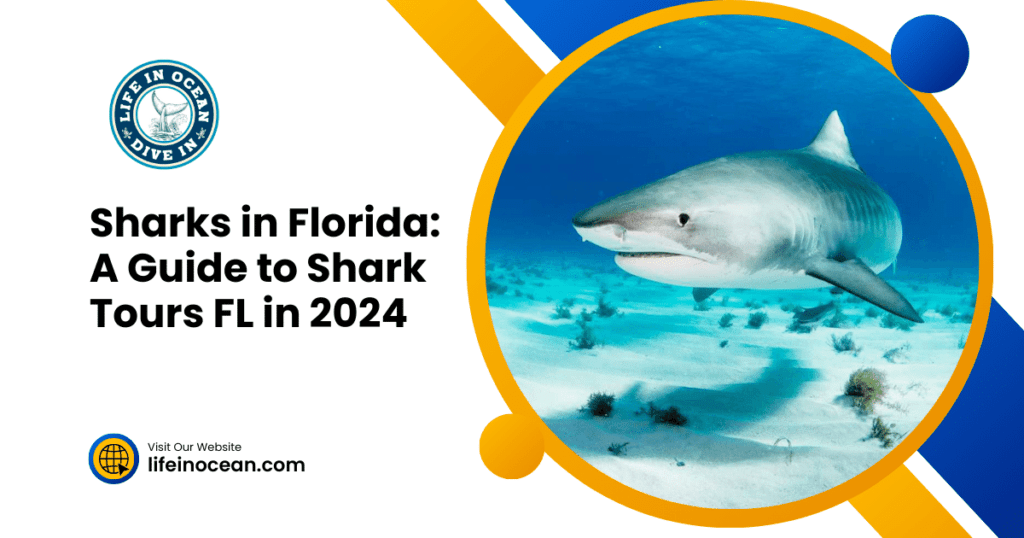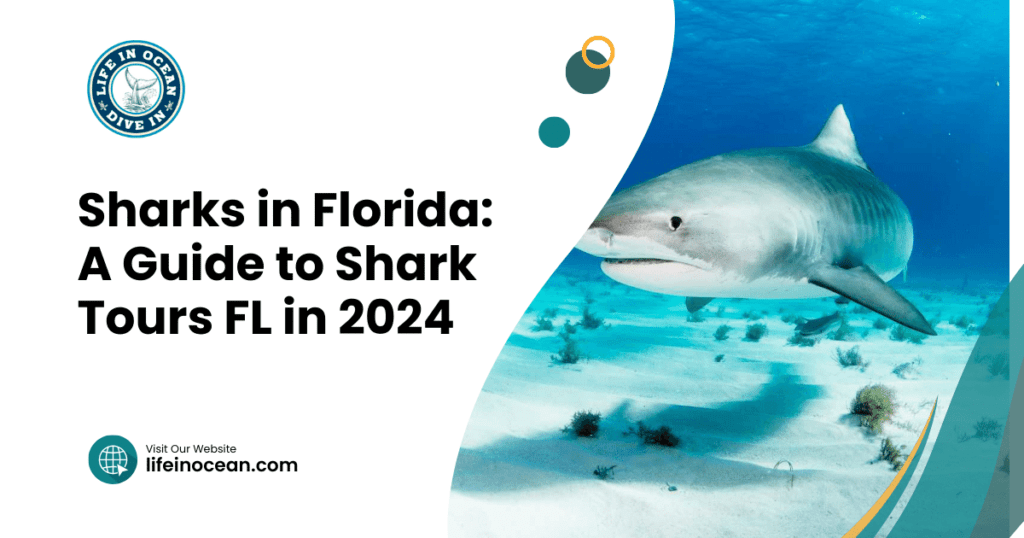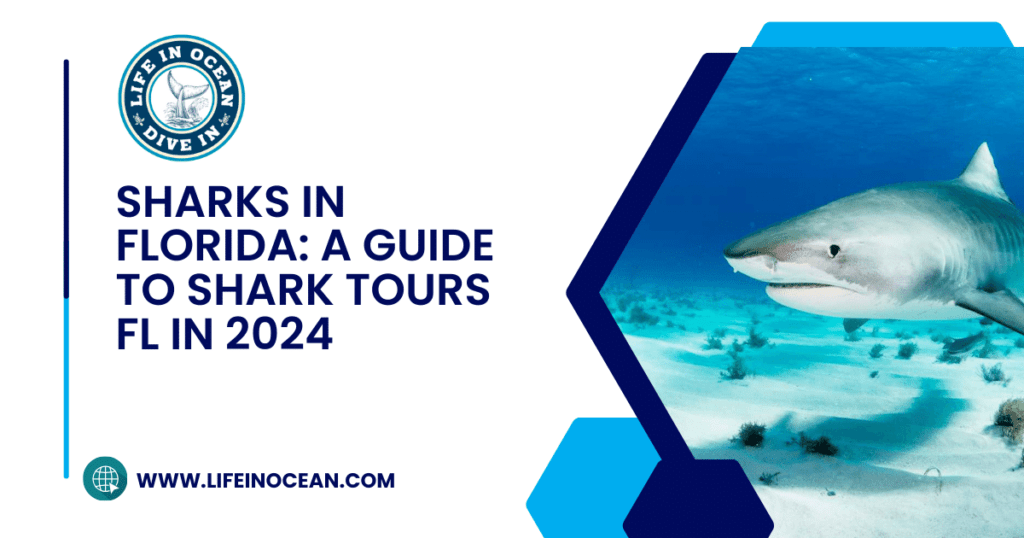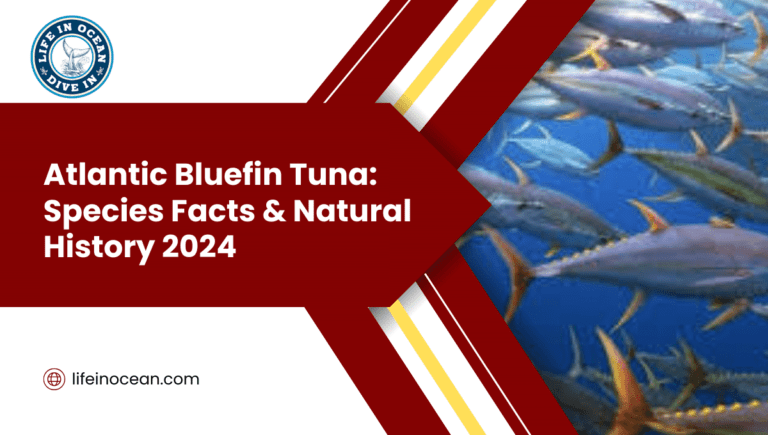Imagine going on thrilling boat dives off the shores of Florida, feeling the adventure as you dive into the crystal-clear waters from the beach. As you descend deeper, an awe-inspiring sight awaits you: a majestic bull shark, dusky shark, silky shark, and reef shark gracefully gliding through the water. Welcome to the world of sharks in Florida, where these incredible creatures call the shallow reefs their home. Whether you’re visiting an aquarium or going cage diving, get ready to witness the awe-inspiring beauty of sharks.
With its diverse coastline and warm waters, Florida is a haven for shark enthusiasts from around the world, including bull sharks, tiger sharks, sandbar sharks, angel shark and reef sharks. Florida’s unique geographical features and abundant marine life make it an ideal spot for encountering various shark species, including bull sharks, hammerhead sharks, tiger sharks, and other fish. From the iconic Great White Shark to the powerful Bull Shark, there is no shortage of opportunities to witness these fascinating fish up close.
Whether you’re on a boat or in a pool, be prepared for thrilling bites from blacktip sharks and hammerhead sharks. Whether you’re on a guided tour or exploring on your own, Florida offers numerous places along the coast to spot sharks and embark on an unforgettable underwater adventure. Shark cage diving Florida Gulf Coast and Florida Keys offer the perfect opportunity for humans to get up close and personal with these fascinating creatures.
Table of Contents
Diverse Shark Species in Florida
Florida has lots of different types of sharks. Some examples of fish that can bite humans are bull sharks, tiger sharks, and hammerhead sharks on a boat. Nurse sharks and lemon sharks are also seen there. Scientists study these sharks to learn more about their behavior and biology, as well as to protect them from human activities that may harm their population in the coming years. For instance, they track dusky sharks with satellite tags to understand where they go and what they like. Other species like reef sharks and silky sharks also live in Florida’s waters and help keep the ecosystem in balance.
Shark Season Timelines

Varying Migration Patterns
Different shark species in Florida have distinct migration patterns throughout the year. This means that you can expect to see different types of sharks at different times.
Winter Months: Blacktip and Spinner Sharks
During the winter months, particularly from December to March, there is an increase in sightings of blacktip and spinner sharks along the coast. These shark species, including the white shark, common shark, and hammerhead shark, are known for their acrobatic displays as they breach the water’s surface during shark diving.
Summer: “Shark Season”
Summer is often referred to as “shark season” in Florida, as this is when larger species like bull and tiger sharks become more active. From May to October, many shark species including the white shark and hammerhead shark patrol the warm waters, engaging in shark diving and hunting for food.
Year-Round Sightings
While specific seasons may see higher concentrations of certain shark species, it’s important to note that some sharks can be found year-round in Florida waters. For example, nurse sharks are commonly spotted near reefs and estuaries throughout the year.
Stay Informed and Be Prepared
Whether you’re a local resident or a visitor to Florida’s beautiful beaches, it’s crucial to stay informed about shark activity and take necessary precautions. Pay attention to any advisories or warnings issued by local authorities and lifeguards regarding shark bites, especially those related to hammerhead sharks.
Great White Sharks in Floridian Waters
While rare, great white shark sightings have been reported off the coast of Florida. These majestic hammerhead sharks, blacktip sharks, and lemon sharks, known for their powerful presence and sharp teeth, occasionally venture into Floridian waters during their migration. Shark bites can occur when these creatures come into contact with humans in the water. This adds to the allure and excitement for shark enthusiasts who are always on the lookout for these incredible predators.
Rare Sightings Off the Coast
Although not a common occurrence, there have been documented cases of great white sharks being spotted in Florida’s coastal waters. These shark bite sightings usually involve juvenile great whites that are exploring new territories during their migration. While they may not stay for an extended period, their presence is enough to create a buzz among locals and tourists alike.
Juvenile Explorers
Juvenile great whites and lemon sharks often venture into Floridian waters as they explore different habitats and search for food sources. As they grow and mature, these young sharks embark on long migrations, sometimes spanning thousands of miles. During this journey, they may pass through Florida’s coastal areas before continuing on their way.
Adding to the Excitement
The presence of great white sharks in Florida‘s waters adds an extra layer of excitement for those fascinated by these magnificent creatures. Shark enthusiasts eagerly await any news or reports about sightings or encounters with these apex predators. It highlights the diverse marine life found in Florida’s ecosystem and underscores the importance of conservation efforts to protect these species.
Human-Shark Interactions
Despite popular belief, unprovoked shark attacks on humans are extremely rare in Florida. Most interactions between humans and sharks involve minor incidents or cases of mistaken identity by the shark. Understanding proper safety measures can help minimize any potential risks associated with human-shark interactions.
Rare Shark Attacks
Contrary to what you might have seen in movies or heard from sensationalized news stories, shark attacks on humans are not as common as one might think. In fact, unprovoked shark attacks in Florida waters are exceptionally rare. While encounters with sharks do happen, they typically result in little to no harm to humans.
Mistaken Identity
Many human-shark interactions occur due to mistaken identity by the shark. Sharks rely heavily on their senses, particularly their sense of smell and electrical signals, to locate prey. Occasionally, a shark may mistake a human for its natural prey such as fish or seals. These cases often result in minor incidents where the shark quickly realizes its mistake and swims away.
Safety Measures
To minimize any potential risks associated with human-shark interactions, it is crucial to understand and follow proper safety measures when spending time in the water. Some essential precautions include avoiding swimming alone at dawn or dusk when sharks are more active, refraining from wearing shiny jewelry that may resemble fish scales, and avoiding areas where there is an abundance of baitfish or seals which could attract sharks.
It’s also important to remember that while sharks are fascinating creatures, they should be observed from a safe distance without provoking them. Engaging in activities like shark diving can provide an opportunity to witness these majestic creatures up close while ensuring both human and shark safety.
Regulations for Shark Fishing
To ensure sustainable practices and protect vulnerable shark populations, strict regulations govern shark fishing activities in Florida. These regulations include catch limits, size restrictions, and seasonal closures.
Catch Limits
Florida has implemented catch limits to prevent overfishing and maintain healthy shark populations. Anglers are allowed to keep a certain number of sharks per person or per boat, depending on the species. These catch limits help control the fishing pressure on sharks and ensure their numbers do not decline drastically.
Size Restrictions
Size restrictions are another crucial aspect of shark fishing regulations in Florida. By imposing minimum size requirements, authorities aim to protect juvenile sharks and allow them to reach reproductive maturity before being targeted by anglers. This measure helps sustain the overall population by ensuring that younger sharks have a chance to grow and reproduce.
Seasonal Closures
Seasonal closures play a significant role in safeguarding specific areas where sharks gather during critical times of the year, such as breeding or migration seasons. During these periods, fishing for certain shark species is prohibited in designated areas to minimize disturbances and protect their natural behaviors.
Licensing Requirements
Proper licensing is mandatory for both recreational and commercial fishing targeting sharks in Florida waters. This requirement ensures that fishermen adhere to the established regulations and guidelines while engaging in shark fishing activities. Licensed individuals are more likely to be aware of conservation efforts and responsible fishing practices.
Shark Encounter Hotspots
If you’re looking for an adrenaline-pumping adventure in the waters of Florida, you’ll be thrilled to know that there are some popular areas along the Floridian coast where you have higher chances of encountering sharks while snorkeling or diving. Let’s dive into these shark encounter hotspots and explore what makes them so exciting.
Gulf Stream Current near Miami Beach
One of the most thrilling spots for shark encounters is near Miami Beach. The Gulf Stream current, a powerful warm ocean current, flows just off the coast, attracting various pelagic species including sharks. This strong current brings nutrient-rich waters from the Caribbean Sea up along the Florida coastline, creating an ideal environment for marine life. So keep your eyes peeled as you explore the shores of Miami Beach; you might just catch sight of a majestic shark gliding through the crystal-clear waters.
Diverse Marine Life in the Florida Keys
Another hotspot for shark encounters is the beautiful archipelago known as the Florida Keys. These islands are renowned for their diverse marine life, and sharks are no exception. From nurse sharks lazily resting on sandy bottoms to sleek reef sharks patrolling vibrant coral reefs, there’s a good chance you’ll come across these fascinating creatures during your underwater adventures in this tropical paradise.
So whether you’re exploring Key Largo, Marathon, or Key West, make sure to venture beneath the surface and witness firsthand why the Florida Keys are a haven for both divers and sharks alike.
Educational Insight at Zoos and Aquariums
Raise Awareness about Sharks
Zoos and aquariums in Florida play a crucial role in educating the public about sharks. These institutions offer educational programs that aim to raise awareness about shark conservation, biology, and the importance of protecting their habitats. Visitors have the opportunity to learn fascinating facts and gain a deeper understanding of these incredible creatures on shark tours.
Learn About Shark Conservation
One of the primary focuses of these educational programs is shark conservation. Through interactive exhibits and informative presentations, visitors can discover the challenges faced by sharks due to habitat loss, overfishing, and pollution. They learn about the importance of preserving shark populations for maintaining balanced marine ecosystems.
Explore Shark Biology
Zoos and aquariums provide a unique opportunity for visitors to delve into the world of shark biology. Through engaging displays and demonstrations, visitors can learn about different species of sharks, their physical adaptations, feeding habits, reproduction cycles, and migratory patterns. This knowledge helps dispel common misconceptions about sharks while fostering respect for these magnificent creatures.
Protecting Shark Habitats
Another critical aspect emphasized by zoos and aquariums is the protection of shark habitats. Visitors are educated on how human activities impact marine environments such as coral reefs, mangroves, and open oceans – all vital habitats for various species of sharks. By understanding the significance of these ecosystems, individuals are empowered to take action in preserving them.
The Fascination of Shark Tooth Hunting
Shark tooth hunting is a popular activity on Florida’s beaches. People search for these ancient treasures because they are interesting and give us a connection to the past. Collecting shark teeth helps us learn about the history of these predators and how they lived. To find shark teeth, you need to be patient and look for small black triangles in the sand or water.

Blacktip sharks often lose their teeth, so they are common finds. When you find a shark tooth, it feels like finding buried treasure. Some people even make jewelry or displays with their finds. Shark tooth hunting is an adventure that lets us connect with nature and learn about history.
Understanding Shark Behavior and Diet
Sharks are more than just fearsome creatures of the deep. They play a vital role in maintaining the delicate balance of marine ecosystems. To better understand their significance, scientists study shark behavior and diet.
Sharks: Opportunistic Scavengers and Active Predators
Sharks have diverse feeding habits that vary depending on the species. Some sharks are opportunistic scavengers, meaning they will eat whatever prey they come across, dead or alive. These sharks help keep the ocean clean by consuming carrion and preventing it from accumulating.
On the other hand, there are active predator sharks that actively hunt for their food. They possess remarkable hunting skills and senses to track down their prey efficiently. These predators play a crucial role in regulating populations of smaller fish and maintaining the overall health of marine ecosystems.
The Ecological Significance of Studying Shark Behavior
Studying shark behavior provides valuable insights into their ecological significance. By understanding how sharks interact with their environment and other species, scientists can assess the impact of human activities on these apex predators.
For example, overfishing can disrupt shark populations, leading to imbalances within marine ecosystems. By studying shark behavior patterns such as migration routes or breeding grounds, researchers can identify areas that need protection to ensure healthy shark populations.
Final Words on Sharks in Florida
And there you have it, a deep dive into the world of sharks in Florida! We’ve explored the diverse species that call these waters home, learned about their behaviors and diets, and even discussed the regulations surrounding shark fishing. But what does all this mean for you? Well, it’s time to take action!
If you’re planning a trip to Florida, make sure to visit one of the many educational zoos or aquariums where you can gain a deeper understanding of these magnificent creatures. And why not try your hand at shark tooth hunting? It’s a thrilling adventure that allows you to connect with the ancient history of these fascinating predators.

Remember, sharks play a vital role in our ecosystem, so let’s continue to respect and protect them. Whether you’re an avid diver or simply someone who enjoys learning about marine life, we all have a responsibility to ensure the conservation of these incredible creatures. So dive in, explore more about sharks in Florida, and become an advocate for their preservation.
FAQs
Can you swim with sharks in Florida?
Yes, you can swim with sharks in Florida! There are several guided tours and diving experiences available where you can safely encounter these magnificent creatures up close. Just make sure to follow the instructions of trained professionals and respect the sharks’ natural habitat.
Are there dangerous sharks in Florida?
While there are some species of sharks that can be potentially dangerous, shark attacks in Florida are rare. The most common types of sharks found in Florida waters, such as blacktip and nurse sharks, are generally not aggressive towards humans. However, it’s always important to exercise caution and be aware of your surroundings when swimming in the ocean.
What should I do if I encounter a shark while swimming?
If you happen to come across a shark while swimming, it’s essential to stay calm and avoid making sudden movements. Slowly back away from the shark while keeping it within your line of sight. Do not provoke or try to touch the shark. Once you have safely distanced yourself, exit the water calmly but swiftly.
Is it safe to surf or paddleboard in areas with sharks?
Surfing or paddleboarding in areas where sharks may be present is generally safe as long as you take necessary precautions. Avoid surfing alone or during dusk/dawn when visibility is low for both you and the shark. Avoid wearing shiny jewelry or brightly colored clothing that could attract their attention.
How can I minimize the risk of a shark encounter?
To minimize the risk of a shark encounter while enjoying Florida’s coastal waters:
- Swim in groups rather than alone.
- Avoid swimming near fishing piers or where people are actively fishing.
- Stay away from areas with schools of fish or seals which may attract sharks.
- Follow any local beach advisories or warnings regarding recent sightings.







